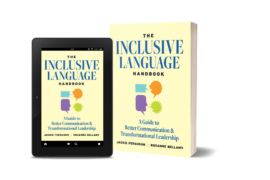Imagine this scenario: A UX designer and her manager are chatting before a video conference begins. They have a new teammate joining the call for the first time but aren’t sure how to address the person, because the newcomer uses “they/them” pronouns. The manager wants to be respectful but hasn’t worked with anyone who uses these pronouns. She is worried about saying the wrong thing in the flow of the meeting and accidentally offending her new employee.
Caught up in the day-to-day flow of work and the difficulty of running a team across 7 states and 3 time zones, the manager knows to reach out to Human Resources for professional development help, but getting a meeting on the schedule is challenging based on her team’s fluid schedules and locations. Stymied, she sends an email to the HR lead and waits for a response. This manager has entered new territory – she knows she needs help, but she’s uncomfortable and anxious.
The leader’s dilemma
As a senior leader, the business challenge is clear: in this case, it’s that the remote team lacks a common language to address potential concerns. For the new person, it could lead to feeling unsafe and misunderstood. As a result, the remote employees may become unproductive, the individual may feel less engaged, which can lead to lower levels of productivity and engagement.
In the c-suite, the boardroom, or in a managerial role, you’re suddenly searching for answers, you don’t know where to turn for trusted content or diversity training for remote teams. Maybe you even feel uneasy with distributing and implementing programs to remote teams.
The question is straightforward: “What do I do next?”
This is the place your managers may be today (and you might be feeling this too). They weren’t trained to lead remote or hybrid teams. They are learning on the fly and dealing with the uncomfortable feeling of simultaneously dealing with sensitive and critical diversity, equity, and inclusion (DEI) issues. No one was talking about virtual training or virtual learning in their MBA classes or as they climbed the leadership ladder.
While the above scenario is largely fictional, it is based on countless discussions with c-suite leaders, managers, and rising professionals – all leaders who want to do the right thing for their organizations and the remote workforce, but are frustrated with what direction to take.
Remote/hybrid culture
The problem for today’s leader is twofold: the challenges brought on by remote work and hybrid operations have both transformed and intensified the underlying notions of leadership and how companies operate. In addition, while the fundamental structure of the work environment is changing, society has been upended culturally as DEI conversations and programming has accrued new meaning around the world.
Remote and hybrid workforces necessitate new ways of thinking about leadership and the resources to train next generation leaders. There are fundamental changes in the way workforces are upskilled and reskilled in this new environment, but leaders must also consider that DEI education and online training is another new piece of the management puzzle. Solving these challenges are critical in creating winning cultures and keeping employees engaged, whether at the individual or team level.
“What we’re focusing on is enhancing the lifecycle of learning for businesses that have teams across the country and around the world,” explains Donald Thompson, CEO at The Diversity Movement. “The next generation of leadership training requires a mix of development, mentorship, and educational resources that are flexible – but must be measurable – to be effective and tied to bottom line results.”
Next generation training and leadership development
Here’s what we’ve learned – addressing new ways of leading remote and hybrid employees requires that organizations offer educational opportunities that are flexible and asynchronous, but also retain aspects of traditional training programs that make sense, including mentorship, guided education paths, team learning, and hands-on exercises. All of these pieces also have to be measurable within the organization’s larger talent development plans, not only to track progress for individuals, but to align the development to real-world business results.
“Next-generation leaders have to think differently about training and education, especially as remote teams work through DEI issues that affect how they do their work internally and when engaging with customers,” explains Kurt Merriweather, Vice President of Products and Innovation at The Diversity Movement. “For example, our MicroVideo platform can help spark conversations while users learn remotely. They can then use the videos as a launch point for sharing experiences together, via team tools like Slack or remote training sessions.”
Certainly, c-suite leaders are feeling the pressure of staying up-to-date on ever-changing topics related to DEI, but it is essential to understand that they and their teams are feeling the same. Imagine the challenges – not only are employees going through their personal, individual journeys with new ideas, but they are on the company journey too – attempting to figure out how changing norms affect their daily professional lives.
For example, one multibillion-dollar healthcare organization realized the challenges of the personal/professional journey when it formed an Employee Resource Group (ERG) to address issues central to LGBTQ+ communities. One of the ERG chairs, a rising leader in the company, realized that while everyone in the group was deeply committed to discussion, learning, and education, a strong majority of the members had also joined because they had a family member in the LGBTQ+ community and they hoped to become more aware about issues central to their family members’ lives.
What this example illustrates is that the line between professional and personal continues to be erased, particularly in remote and hybrid workforces. There are the technical difficulties, such as scheduling and operating across multiple time zones, but also the interpersonal challenges when addressing sensitive issues via video calls or internal messaging systems.
Micro-learning and remote teams
MicroVideos by The Diversity Movement, named a Fast Company 2022 World Changing Idea, serves remote and hybrid organizations particularly well because of its built-in flexibility and trusted content. For an LGBTQ+ ERG leader, the MicroVideo learning path provides a foundational level of knowledge on important topics and a playbook for individuals as they watch right-sized videos that fit into their schedules.
When the group meets later over a video conference, they can use what they’ve watched as a guide for deeper sharing and conversation. What leaders have found is that the authority and value of the MicroVideos platform has eased the path for more engaging interaction and further learning by creating a safe space for discussion. Conversations are focused on the video content, which takes the edge off sensitive issues as members get acclimated to talking about sometimes sensitive or uncomfortable ideas.
While leaders address the imminent challenges in implementing DEI programming into their overall education and training, they should also consider how learning for remote workers can be beneficial. For example, a manager grappling with inclusion on her team can access learning tools at home in an environment where she feels safe, comfortable, and open to new ideas. Asynchronous tools also provide her and her team with flexibility as they engage with new ideas when it best suits them.
“Whether it’s the CEO, CDO, Chief People Officer, or a board member who wants to find the best tools to educate their remote leaders and their teams, I tell them the same thing,” says Thompson. “To create a stronger remote organization, they need flexible, innovative tools that empower learning with the feedback loop that proves the effort is resulting in a thriving culture ready to win.”
Download our guide to DEI for remote teams
Kurt Merriweather, CDE, is an accomplished product strategist and business executive. He is co-founder and Vice President of Products & Innovation at The Diversity Movement. Connect with him on Linkedin.






